Understanding Common Dog Skin Problems: Symptoms and Solutions
As a loving dog owner, you may have noticed your furry friend scratching, licking, or showing signs of discomfort related to their skin. Dog skin problems are a common concern that can affect your pet's health and quality of life. In this article, we'll explore the most frequent skin issues dogs face, how to identify them, and what steps you can take to provide relief and treatment for your canine companion.

What are the most common skin problems in dogs?
Dogs can suffer from a variety of skin conditions, each with its own set of symptoms and causes. Some of the most prevalent issues include:
-
Allergies: Environmental allergens, food sensitivities, or flea bites can cause itching, redness, and inflammation.
-
Hot spots: Also known as acute moist dermatitis, these are painful, inflamed areas that can develop rapidly.
-
Parasites: Fleas, ticks, and mites can irritate your dog’s skin and lead to more serious conditions.
-
Fungal infections: Yeast infections and ringworm are common fungal problems that affect dogs.
-
Bacterial infections: These can occur as a primary issue or secondary to other skin conditions.
Understanding these common problems is the first step in helping your dog find relief from skin discomfort.
How can I identify skin issues in my dog?
Learn how to identify and treat common dog skin issues by observing your pet’s behavior and appearance. Look out for the following signs:
-
Excessive scratching, licking, or biting at the skin
-
Redness or inflammation
-
Hair loss or bald patches
-
Dry, flaky, or scaly skin
-
Bumps, lumps, or rashes
-
Foul odor coming from the skin or ears
-
Changes in skin color or texture
If you notice any of these symptoms persisting for more than a few days, it’s essential to consult with your veterinarian for a proper diagnosis and treatment plan.
What are some common causes of dog skin problems?
Discover the symptoms and solutions for dog skin problems by understanding their root causes. Several factors can contribute to skin issues in dogs:
-
Allergies: Environmental allergens (pollen, dust, mold), food sensitivities, or flea saliva can trigger allergic reactions.
-
Parasites: Fleas, ticks, and mites can cause intense itching and skin irritation.
-
Hormonal imbalances: Conditions like hypothyroidism can affect skin health.
-
Nutritional deficiencies: Poor diet or lack of essential nutrients can lead to skin problems.
-
Genetic predisposition: Some breeds are more prone to certain skin conditions.
-
Environmental factors: Extreme temperatures, humidity, or exposure to irritants can impact skin health.
Identifying the underlying cause is crucial for effective treatment and prevention of future issues.
How can I treat my dog’s skin problems at home?
While professional veterinary care is often necessary, there are some steps you can take at home to help alleviate your dog’s skin discomfort:
-
Regular bathing with a gentle, dog-specific shampoo
-
Brushing your dog’s coat to remove loose hair and distribute natural oils
-
Providing a balanced diet rich in omega-3 fatty acids
-
Using flea and tick prevention products as recommended by your vet
-
Keeping your dog’s living area clean and free from potential allergens
-
Applying cool compresses to soothe irritated skin
-
Using pet-safe moisturizers for dry skin (under veterinary guidance)
Remember that these home remedies should complement, not replace, professional veterinary care for persistent or severe skin issues.
When should I seek veterinary care for my dog’s skin problems?
Find solutions for your furry friend’s skin problems by knowing when to consult a professional. While some minor skin issues may resolve on their own, certain signs indicate the need for veterinary attention:
-
Persistent itching or discomfort lasting more than a few days
-
Open wounds, hot spots, or signs of infection
-
Significant hair loss or changes in coat texture
-
Noticeable changes in your dog’s behavior or energy levels
-
Symptoms that worsen despite home care efforts
-
Any sudden or severe skin changes
Early intervention can prevent minor skin problems from becoming more serious and potentially difficult to treat.
What treatments might a veterinarian recommend?
When you seek professional help, your veterinarian may recommend various treatments depending on the specific skin condition affecting your dog:
-
Topical medications: Creams, ointments, or sprays to address localized issues
-
Oral medications: Antibiotics, antifungals, or antihistamines for systemic treatment
-
Medicated shampoos: To soothe irritated skin and address underlying causes
-
Dietary changes: Elimination diets or supplements to address nutritional factors
-
Allergy testing and immunotherapy: For dogs with severe allergies
-
Parasite control: Prescription-strength flea and tick preventatives
-
Skin scrapings or biopsies: To diagnose more complex skin conditions
Your veterinarian will develop a tailored treatment plan based on your dog’s individual needs and the specific skin problem identified.
In conclusion, understanding common dog skin problems and their symptoms is crucial for maintaining your pet’s health and comfort. By staying vigilant, providing appropriate home care, and seeking professional help when needed, you can help your furry friend find relief from skin issues and enjoy a happier, healthier life.
This article is for informational purposes only and should not be considered medical advice. Please consult a qualified healthcare professional for personalized guidance and treatment.




